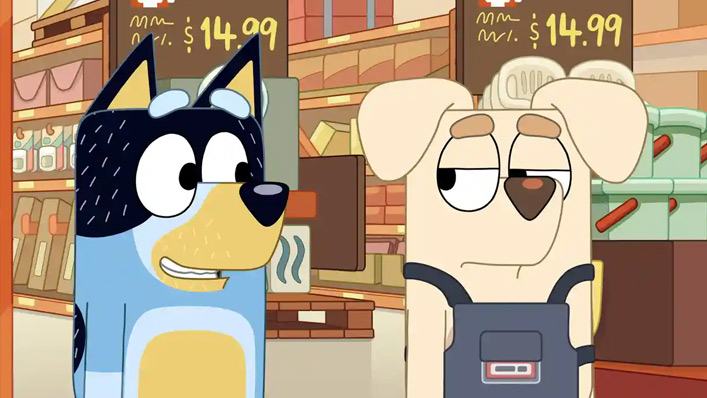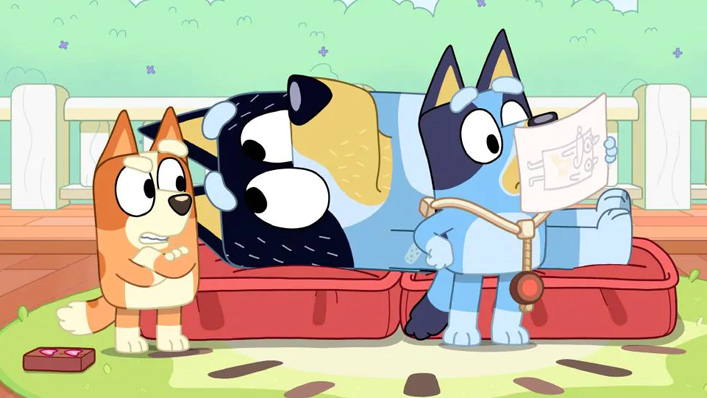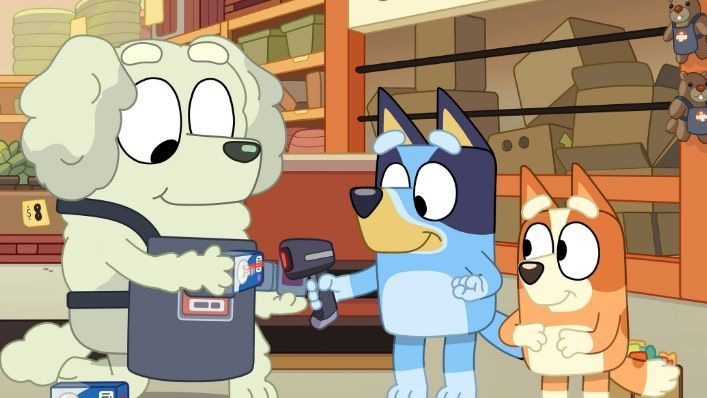I am a single, adult, childless man. And I Iove Bluey

Bluey is for preschoolers, you say? Pffft. This delightful ABC animation appeals to all ages—according to our single, childless, but totally smitten critic Travis Johnson.
In these grim times we find solace wherever we can, and for me right now it’s an Australian children’s cartoon about a curious six year old blue heeler and her family.
See also
* Guide to Bluey season one
* Guide to Bluey season two
* All new streaming movies & series
Many of you out there are no doubt familiar with Bluey thanks to our own sprogs’ obsession with the show, which has turned into an unexpected but utterly worthy worldwide hit. For me, kid-free and unpartnered, Bluey entered my world by a similar vector, but one step removed. A mate who is father to a 5-year-old put me onto it, opining over drinks that it was a really good show, and certainly a cut above the usual dross that he, as a parent, was forced to endure during his offspring’s screen time.
Curious, I decided to give it a spin. And reader, I was hellaciously impressed.
In a nutshell
At first glance, Bluey could be any other animated series aimed at the pre-school set. Created by Joe Brumm and produced by Queensland animation outfit Ludo, Bluey follows the adventures of the titular pup and 4-year-old year old red heeler sister, Bingo.
Doting dad Bandit (David McCormack from ‘90s indie musical mainstays Custard) and mum Chilli (Melanie Zanetti) are on hand to dole out advice and occasionally setter the littluns away from danger. Each relatively self-contained episode clocks in at around the six minute mark, and deals with one discreet problem, issue or lesson in a way that’s to the point and not liable to tax the attention spans of the very young.
Wryly, drily surreal
But what jumps the age barrier is the show’s keen sense of humour, which is at once deceptively simple and wonderfully off-kilter, trucking in the kind of surreal non-sequiturs that kids fire off all the time.
The episode Grannies is an all-timer. Bluey and Bingo, playing a game where they pretend to be little old ladies, argue over whether grannies can floss (the dance, not the oral hygiene). Their quest for an answer takes them to mum, then dad, then a video call to their actual grandparents (voiced by Ian McFadyen and Chris Brumm), taking in a sweet little life lesson about the difference between being right and being kind along the way.
It’s also devastatingly funny in a way that almost defies description, from the kids’ creaky little old ladies’ voices, to dad Bandit’s resigned but indulgent exasperation, to the simple sight of Nana Heeler trying to floss, it’s an absolute scream. In a different episode, Takeaway, Bandit has to contend with his two distractible kids trying to entertain themselves while they wait for a restaurant to finish cooking their takeaway order. It’s a tiny little bit of business that escalates into the kind of joyful chaos that anyone who has spent time around young children will recognise.
That’s key, I think. Bluey doesn’t use one-liners and set up/punchline structured jokes; its humour is observational and its situations readily identifiable. They also drop the odd pop culture reference that lands delightfully—check out the Raiders of the Lost Ark tribute in Yoga Ball.

Out of the mouths of babes
The voice talent is incredible. While David McCormack may be the MVP (and a cultural touchstone to ‘90s relics like me), the entire bench is full of power players. Anthony Field of The Wiggles turns up as a postie, Myf Warhurst as Bluey and Bingo’s aunt; indie pop singer Megan Washington as a teacher, and more. Like The Simpsons, we should expect a guest spot on Bluey to become some kind of voice-over rite de passage, a necessary box tick for the cooler kind of celebrity.
But the real master stroke is having Bluey, Bingo, and their fellow tykes voiced by the children of the production crew, rather than having adult voice actors mimic the tones of children. This gives the whole thing a strikingly and disarmingly genuine flavour, the questions that Bluey and co. fire off at the adults in their lives ringing true to the ears of those who have been subject to similar barrages. It’s not a new trick; the old Peanuts animated specials also cast children as Charlie Brown, Linus, and the gang. But hey, if you’re being compared to Peanuts, you must be on a good wicket.

It feels good, man
Ultimately, though, Bluey’s real appeal is its profoundly positive messaging. It’s a show that presents an uplifting, communitarian look at modern Australian family life that prioritises little viewers but is recognizable and appealing to adults as well. It doesn’t clumsily try to split the difference and slip in mature jokes that the kids won’t understand; it’s a genuinely enjoyable series that parents and children can enjoy together—as well as the odd child-hearted curmudgeon like me.
















